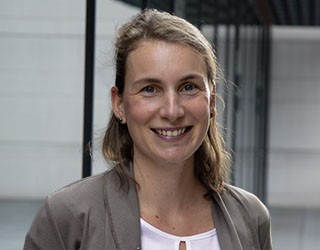Spezialgebiete
- Menschliche Migration und lokale Lebensgrundlagen
- Sozial-ökologische Systeme
- Quantitative, qualitative und partizipative Ansätze (QCA, Bayes’sche Netzwerke, Regressionsanalysen, GIS)
- Strukturwandel und regionale Transformation
Erfahrungen
Dr. Juliane Groth ist seit Juli 2023 wissenschaftliche Mitarbeiterin in der Gruppe »Innovative Regionen« am Fraunhofer IMW. Zuvor war sie als wissenschaftliche Mitarbeiterin und Doktorandin am Helmholtz-Zentrum für Umweltforschung (UFZ) in Leipzig tätig.
Im Rahmen ihrer Promotion mit dem Titel »The linkages between migration and environmental change in Ethiopia – Empirical evidence from rural sending and receiving areas« erforschte sie mittels qualitativer und partizipativer Methoden das Zusammenspiel verschiedener ökologischer, sozialer, ökonomischer, institutioneller und politischer Einflussfaktoren auf Migrationsentscheidungen. Anhand eines analytisch-statistischen Ansatzes zeigte sie den Einfluss der Migration auf die Lebensbedingungen der Migrant*innen und auf die Umwelt in der Aufnahmegesellschaft.
Von 2015 bis 2017 arbeitete Juliane Groth als Wissenschaftlerin an der United Nations University – Institute for Environmental and Human Secuirity (UNU-EHS) in Bonn an einem Projekt zur Erstellung eines Risiko- und Verwundbarkeitsindex für Nordkirgistan. Zuvor studierte sie Geographie an der Leopold-Franzens-Universität Innsbruck (M. Sc.) und Technischen Universität Dresden (B. Sc.).
Juliane Groth bringt umfangreiche Erfahrungen aus der ortsbezogenen sozial-ökologischen Forschung, der Implementierung internationaler Feldkampagnen zur Datenerhebung und zu qualitativ-partizipativen und statistisch-analytischen Analyseansätzen mit. Ihre vielfältigen Kenntnisse und Kompetenzen setzt sie am Fraunhofer IMW in diversen Projekten zu den Themen Strukturwandel, nachhaltige regionale Transformation und Innovationsdynamiken und zur Evaluation von Förderprogrammen um.
Aktuelle Projekte
- Genesis – Gestaltung neuer Entwicklungspfade im Strukturwandel in Sachsen
- Q.E.D. – Quantum Ecosystem Deutschland
- Schwerpunktstudie »Quantentechnologien und Quanten-Ökosysteme«
